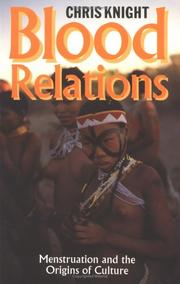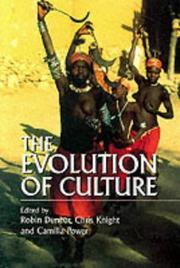| Listing 1 - 10 of 24 | << page >> |
Sort by
|
Book
ISBN: 0300049110 030018655X Year: 1991 Publisher: New Haven Yale university
Abstract | Keywords | Export | Availability | Bookmark
 Loading...
Loading...Choose an application
- Reference Manager
- EndNote
- RefWorks (Direct export to RefWorks)
The emergence of symbolic culture is generally linked with the development of the hunger-gatherer adaptation based on a sexual division of labor. This original and ingenious book presents a new theory of how this symbolic domain originated. Integrating perspectives of evolutionary biography and social anthropology within a Marxist framework, Chris Knight rejects the common assumption that human culture was a modified extension of primate behavior and argues instead that it was the product of an immense social, sexual, and political revolution initiated by women. Culture became established, says Knight, when evolving human females began to assert collective control over their own sexuality, refusing sex to all males except those who came to them with provisions. Women usually timed their ban on sexual relations with their periods of infertility while they were menstruating, and to the extent that their solidarity drew women together, these periods tended to occur in synchrony. The result was that every month with the onset of menstruation, sexual relations were ruptured in a collective, ritualistic way as the prelude to each successful hunting expedition. This ritual act was the means through which women motivated men not only to hunt but also to concentrate energies on bringing back the meat. Knight shows how this hypothesis sheds light on the roots of such cultural traditions as totemic rituals, incest and menstrual taboos, blood-sacrifice, and hunters' atonement rites. Providing detailed ethnographic documentation, he also explains how Native American, Australian Aboriginal, and other magico-religious myths can be read as derivatives of the same symbolic logic.
#SBIB:39A3 --- Culture. --- Menstruation. --- Sociology. --- Menstruation --- -Menses --- Periods (Menstruation) --- Menstrual cycle --- Emmenagogues --- General Social Development and Population --- Menstruations --- Beliefs --- Cultural Background --- Customs --- Background, Cultural --- Backgrounds, Cultural --- Belief --- Cultural Backgrounds --- Cultures --- Custom --- Antropologie: geschiedenis, theorie, wetenschap (incl. grondleggers van de antropologie als wetenschap) --- Social aspects --- Social aspects. --- -Antropologie: geschiedenis, theorie, wetenschap (incl. grondleggers van de antropologie als wetenschap) --- -General Social Development and Population --- Menses --- Culture --- Sociology --- Cultural Relativism --- Cultural Relativisms --- Relativism, Cultural --- Relativisms, Cultural
Book
ISBN: 0300222157 9780300222159 9780300221466 0300221460 Year: 2016 Publisher: New Haven, CT
Abstract | Keywords | Export | Availability | Bookmark
 Loading...
Loading...Choose an application
- Reference Manager
- EndNote
- RefWorks (Direct export to RefWorks)
A fresh and fascinating look at the philosophies, politics, and intellectual legacy of one of the twentieth century's most influential and controversial minds Occupying a pivotal position in postwar thought, Noam Chomsky is both the founder of modern linguistics and the world's most prominent political dissident. Chris Knight adopts an anthropologist's perspective on the twin output of this intellectual giant, acclaimed as much for his denunciations of US foreign policy as for his theories about language and mind. Knight explores the social and institutional context of Chomsky's thinking, showing how the tension between military funding and his role as linchpin of the political left pressured him to establish a disconnect between science on the one hand and politics on the other, deepening a split between mind and body characteristic of Western philosophy since the Enlightenment. Provocative, fearless, and engaging, this remarkable study explains the enigma of one of the greatest intellectuals of our time.
PHILOSOPHY / Language. --- Chomsky, Noam --- Criticism and interpretation. --- Chomsky, Abraham Noam

ISBN: 0300063083 Year: 1995 Publisher: New Haven (Conn.) Yale University Press
Abstract | Keywords | Export | Availability | Bookmark
 Loading...
Loading...Choose an application
- Reference Manager
- EndNote
- RefWorks (Direct export to RefWorks)
Book
ISBN: 9780300228762 Year: 2018 Publisher: New Haven, Conn. Yale University Press
Abstract | Keywords | Export | Availability | Bookmark
 Loading...
Loading...Choose an application
- Reference Manager
- EndNote
- RefWorks (Direct export to RefWorks)
Book
ISBN: 9780199545858 9780199545865 Year: 2009 Publisher: Oxford Oxford University Press
Abstract | Keywords | Export | Availability | Bookmark
 Loading...
Loading...Choose an application
- Reference Manager
- EndNote
- RefWorks (Direct export to RefWorks)
Linguistics --- Anthropological linguistics --- Historical linguistics --- Language and languages --- Sociolinguistics --- Origin of languages --- Speech --- Diachronic linguistics --- Dynamic linguistics --- Evolutionary linguistics --- Language and history --- Anthropo-linguistics --- Ethnolinguistics --- Language and ethnicity --- Linguistic anthropology --- Linguistics and anthropology --- Anthropology --- Language and culture --- Origin --- History --- Africa --- Languages. --- Sociology --- Integrational linguistics (Oxford school)
Book
ISBN: 0191562874 0191720364 0199545871 019954588X 1282268791 9786612268793 Year: 2009 Publisher: Oxford University Press
Abstract | Keywords | Export | Availability | Bookmark
 Loading...
Loading...Choose an application
- Reference Manager
- EndNote
- RefWorks (Direct export to RefWorks)
Book
ISBN: 1282268619 9786612268618 0191567671 9780191567674 9780199545858 0199545855 9780199545865 0199545863 9781282268616 6612268611 1383045194 Year: 2023 Publisher: Oxford : Oxford University Press,
Abstract | Keywords | Export | Availability | Bookmark
 Loading...
Loading...Choose an application
- Reference Manager
- EndNote
- RefWorks (Direct export to RefWorks)
Focusing on the African origins of human language, this title explores the origins of language and culture 250,000-150,000 years ago when modern humans evolved in Africa. Internationally renowned scholars address the fossil, genetic, and archaeological evidence and critically examine the ways it has been interpreted.
Language and languages --- Historical linguistics --- Anthropological linguistics --- Sociolinguistics --- Anthropo-linguistics --- Ethnolinguistics --- Language and ethnicity --- Linguistic anthropology --- Linguistics and anthropology --- Anthropology --- Language and culture --- Linguistics --- Diachronic linguistics --- Dynamic linguistics --- Evolutionary linguistics --- Language and history --- Origin of languages --- Speech --- Origin. --- History --- Origin --- Africa --- Languages. --- Sociology --- Integrational linguistics (Oxford school)
Book
ISBN: 9780199545872 9780199545889 Year: 2009 Publisher: Oxford Oxford university press
Abstract | Keywords | Export | Availability | Bookmark
 Loading...
Loading...Choose an application
- Reference Manager
- EndNote
- RefWorks (Direct export to RefWorks)
Linguistics --- Anthropological linguistics --- Historical linguistics --- Language and languages --- Origin of languages --- Speech --- Diachronic linguistics --- Dynamic linguistics --- Evolutionary linguistics --- Language and history --- Anthropo-linguistics --- Ethnolinguistics --- Language and ethnicity --- Linguistic anthropology --- Linguistics and anthropology --- Anthropology --- Language and culture --- Origin --- History

ISBN: 0748610766 Year: 1999 Publisher: Edinburgh Edinburgh University Press
Abstract | Keywords | Export | Availability | Bookmark
 Loading...
Loading...Choose an application
- Reference Manager
- EndNote
- RefWorks (Direct export to RefWorks)
Ethnology. Cultural anthropology --- Sociology of culture --- Culture. --- Social evolution.
Book
ISBN: 9780199665334 9780199665327 019966532X 0199665338 0191643122 0191779725 9780191779725 9780191643125 Year: 2014 Publisher: Oxford Oxford University Press
Abstract | Keywords | Export | Availability | Bookmark
 Loading...
Loading...Choose an application
- Reference Manager
- EndNote
- RefWorks (Direct export to RefWorks)
This book presents a new perspective on the origins of language, and highlights the key role of social and cultural dynamics in driving language evolution. It considers, among other questions, the role of gesture in communication, mimesis, play, dance, and song in extant hunter-gatherer communities, and the time-frame for language evolution.
Sociolinguistics --- 800 <09> --- Taalwetenschap. Taalkunde. Linguistiek--Geschiedenis van ... --- Langage et langues --- Évolution sociale. --- Cognition et culture. --- Comportement social chez les animaux. --- Homme --- Origines. --- Évolution. --- 800 <09> Taalwetenschap. Taalkunde. Linguistiek--Geschiedenis van ... --- Taalwetenschap. Taalkunde. Linguistiek--Geschiedenis van .. --- Taalwetenschap. Taalkunde. Linguistiek--Geschiedenis van . --- Language and languages --- Social evolution. --- Cognition and culture. --- Social behavior in animals. --- Human evolution. --- Origin. --- Evolution (Biology) --- Physical anthropology --- Evolutionary psychology --- Human beings --- Animal behavior --- Animal societies --- Culture and cognition --- Cognition --- Culture --- Ethnophilosophy --- Ethnopsychology --- Socialization --- Cultural evolution --- Cultural transformation --- Culture, Evolution of --- Evolution --- Social change --- Origin of languages --- Speech --- Origin
| Listing 1 - 10 of 24 | << page >> |
Sort by
|

 Search
Search Feedback
Feedback About UniCat
About UniCat  Help
Help News
News